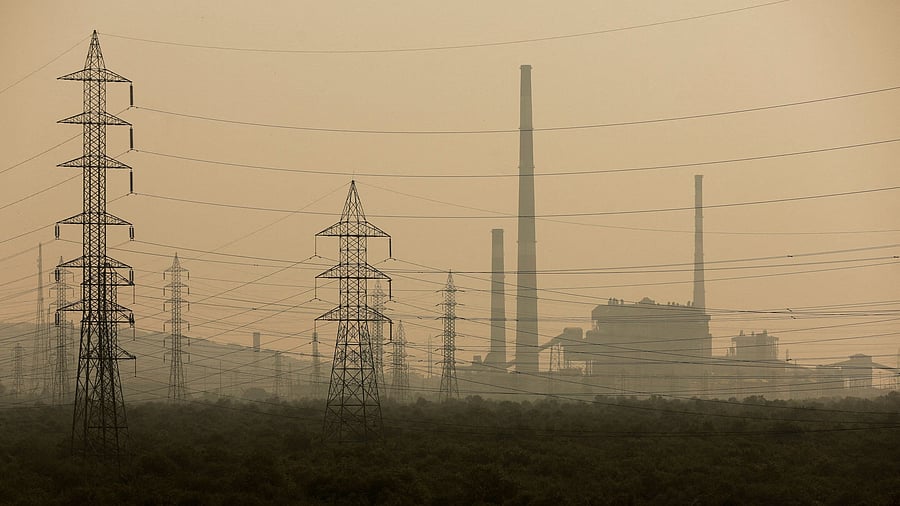
Representative image showing power grids.
Credit: Reuters File Photo
The ‘One Nation, One Grid, One Tariff’ policy is an essential initiative for states like Bihar, which have lagged in economic and social development. With a population exceeding 13 crore, Bihar faces significant economic disparities and energy inequities compared to states like Delhi, which has a population of approximately 3.3 crore. Delhi's per capita income has risen by 22 per cent over two years, reaching ₹4,61,910 in 2023-2024, making it 2.5 times higher than the national average.
In contrast, Bihar's per capita income stands at ₹50,555, significantly below the national average of ₹86,659. Despite these economic differences, Delhi residents benefit from substantially cheaper electricity and fuel prices, highlighting the urgent need for a unified energy policy to ensure equitable access and affordability across all regions.
Energy consumption statistics further underscore regional inequalities. In the fiscal year ending March 2023, Bihar's electricity consumption was approximately 30,338 GWh, while Delhi's was slightly higher at 34,107 GWh.
However, considering population differences, Bihar's per capita electricity consumption is among the lowest in India, standing at just 350 kWh annually. In contrast, Delhi's per capita electricity consumption is significantly higher, reflecting better access and affordability of electricity.
The disparities extend beyond consumption to affordability. In Bihar, high energy tariffs place an undue burden on households and businesses, stifling industrial growth and economic opportunities. The Bihar Electricity Regulatory Commission (BERC) increased power tariffs in the state by 24.1 per cent for FY 2023-2024, effective from April 1, 2023.
For domestic consumers, the tariff for consumption up to 100 units is ₹3.9 per kWh, with higher consumption levels incurring progressively higher rates.
In contrast, Delhi's residents benefit from subsidised electricity and efficient infrastructure, allowing them to access energy at a fraction of the cost paid by Biharis. For instance, domestic consumers in Delhi consuming up to 200 units are charged ₹3 per unit, with rates increasing for higher consumption slabs.
This imbalance not only limits Bihar's growth potential but also perpetuates poverty, as families and businesses in the state struggle to bear the high costs of essential energy services.
The introduction of smart meters in Bihar aimed to improve billing accuracy and reduce power theft. However, for many residents, these smart meters have become a financial burden, leading to higher bills and widespread dissatisfaction. The lack of proper consumer education and support has exacerbated the situation, leaving many Biharis feeling unfairly penalised.
A unified tariff policy through ‘One Nation, One Grid, One Tariff’ can help bridge these inequities and unlock Bihar's potential for growth. By standardising energy prices across states, the policy would ensure that citizens, regardless of where they live, pay the same rates for electricity and fuel. This move is critical for fostering equity, as it would enable states like Bihar to attract industries, generate employment, and stimulate economic development.
Affordable and reliable energy access would also transform rural areas by powering schools, hospitals, and small businesses, improving the quality of life for crores of people. Federalism in India must not remain confined to the political domain; it must extend to social and economic spheres. Only when resources and opportunities are distributed equitably across states can the true essence of federalism be realised.
The ‘One Nation, One Grid, One Tariff’ policy has the potential to transform poverty alleviation efforts, especially in states like Bihar, where over 26.59 per cent of the population is facing multidimensional poverty. Affordable energy access can enhance productivity and income opportunities, particularly in agriculture and small industries, which are vital to Bihar’s economy. Lower energy costs would enable farmers to adopt modern technologies, improving yields and reducing losses, while small industries could flourish, creating jobs and boosting incomes. Such measures not only address economic disparities but also ensure that federalism becomes a mechanism for empowering every citizen, transcending mere political arrangements.
The policy would also mitigate regional imbalances in infrastructure development. A unified grid can reduce transmission losses, optimise resource use, and attract much-needed investment. Upgrading transmission and distribution networks would bolster the state's energy infrastructure, fostering inclusive development and demonstrating a commitment to equitable growth across the nation.
While implementation poses challenges such as varied infrastructure readiness and regulatory co-ordination, these can be addressed through financial investments and collaborative governance. The benefits of the policy — economic equity, poverty reduction, and sustainable growth — far outweigh these hurdles.
This initiative is not merely about energy unification; it is a step toward redefining federalism as inclusive and comprehensive. By bridging the gap between political intentions and socio-economic realities, the policy ensures equal opportunities for all citizens to thrive, driving India toward a more equitable and prosperous future.
(Sudhakar Singh is a Lok Sabha MP representing Buxar, Bihar. Sarish Tripathi is a post-graduate in public policy from NLSIU, Bengaluru.)
Disclaimer: The views expressed above are the author's own. They do not necessarily reflect the views of DH.